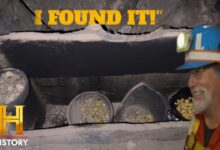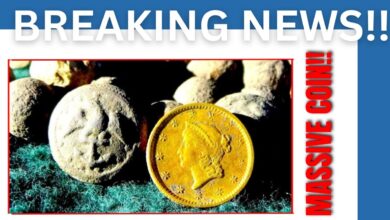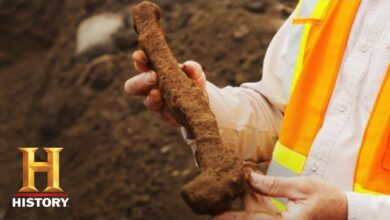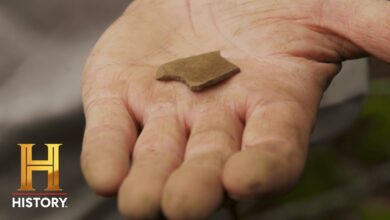Rick Lagina’s $50 Million Oak Island Discovery – Gold & Relics Unearthed!
Rick Lagina’s $50 Million Oak Island Discovery – Gold & Relics Unearthed!

I figure it’s like old home week, right?
We came back home cuz we never finished this.
We could put some potential questions on here just so we all know what is possible.
Not quite.
We were close.
In a way, we know what we’re looking for.
We’re definitely looking for more pieces of what we found earlier.
I mean, you clearly that was one of the more interesting areas that we’ve drilled into in the money pit.
For more than two centuries, Oak Island has guarded its secrets beneath layers of rock, mud, and mystery.
Many have tried to break through its defenses.
Few have succeeded, but now Rick Lagginina stands on the brink of rewriting the island’s history forever.
What began as a lifelong obsession has turned into the most extraordinary discovery of his treasure hunting career.
After years of relentless digging, battling the island’s legendary flood tunnels, and chasing leads that vanished into the depths, Rick’s crew has finally struck gold.
Literally, millions of dollars worth of gold and priceless artifacts have emerged from the earth.
Each piece a clue to an even bigger prize still waiting to be uncovered.
This isn’t just another chapter in the Oak Island mystery.
It’s the kind of breakthrough treasure hunters dream about.
But as history has shown, every major find on the island comes with new questions, new dangers, and new theories that could change everything we thought we knew.
Stay with us as we reveal how Rick’s biggest gamble became his most stunning victory yet, and why this discovery could be just the beginning.
Don’t forget to like, subscribe, and join us for more Oak Island discoveries.
The year was quiet on Oak Island, but for 16-year-old Rick Lagginina, the place was alive with the hum of possibility.
While other teenagers were chasing summer jobs or weekend fun, Rick was kneede in the salty air near Smith’s Cove, working side by side with his 91-year-old grandfather.
It wasn’t just a summer pastime.
It was a living bridge between generations.
His grandfather wasn’t an ordinary old man.
He carried decades of stories, hard-earned skills, and the kind of wisdom you can’t find in books.
By that age, Rick had already heard every legend about Oak Island, the mysterious money pit, the flood tunnels, and the countless expeditions that ended in frustration.
But instead of being discouraged, those stories lit a fire in him.
That fire soon turned into action.
Most people his age would be lucky to have a few hundred saved.
Rick, however, made a bold choice.
He poured $100,000 of his own money into an untouched section of Oak Island.
For perspective, that’s equivalent to the cost of a small house in Nova Scotia at the time, or nearly 50 times the average teenage savings.
It was a gamble, but one backed by a family legacy and an unshakable belief that something valuable lay hidden beneath the island’s stubborn soil.
The statistics were not in his favor.
Over 200 years of documented treasure hunts, dozens of companies, and millions of dollars had failed to crack Oak Island’s code.
Yet Rick saw those odds as a challenge, not a deterrent.
For him, it wasn’t just about gold or artifacts.
It was about proving that persistence could triumph over centuries of mystery.
And with that, Rick quietly began to take over the family’s treasure hunting legacy, one shovel full at a time.
By now, Rick Lagginina had learned one of the hardest truths in treasure hunting.
You can’t dig without dollars.
Oak Island was unforgiving.
Every shovel turned wasn’t just effort, it was expense.
And with $100,000 of his own money already sunk into the project, Rick faced a choice.
Dig slow and risk running out of funds or find a way to keep the dream alive while chasing the big prize.
He chose both.
In a bold strategic move, Rick split his crew into two distinct teams, each with a separate mission, pace, and payoff potential.
The Wolf Cut Crew was his long game.
Stationed over an untouched section of Oak Island, their work was slow, methodical, and punishing.
They drilled deep into soil that hadn’t been disturbed for centuries, inching toward possible vaults or ancient structures.
Every foot they dug was a test of patience.
Machines strained, mud caked, and progress crawled at inches per day.
Statistically, this was the crew most likely to hit a jackpot, but also the one most likely to burn through time and money before finding anything.
On the other side was the drift cut crew, the fast movers.
Their mission was simple.
Hunt for quick wins, scour areas with historical clues, unear small but valuable finds, and convert discoveries into cash flow to keep fuel in the tanks, wages paid, and equipment running.
It was a treasure hunting equivalent of keeping the lights on while building the cathedral.
The numbers were stark.
Wolf Cut’s operation could cost three times more per week than Drift Cut, but Drift Cut’s success rate was five times higher for finding sellable artifacts.
Rick knew the gamble meant walking a tight rope.
One team funded the present, the other dug for the future.
It was a risky balancing act, but Rick understood something most failed expeditions didn’t.
On Oak Island, you can’t win the war unless you survive the battle.
Oak Island didn’t care about Rick Lagginina’s plans.
It didn’t care about timelines, budgets, or dreams.
The ground was hard, frozen like concrete in some places, and mercilessly slow to yield any secrets.
At the Wolf Cut site, the crew fought a silent war against the Earth itself.
The drilled teeth screamed as they bit into frozen layers, steam rising in the cold air.
Progress wasn’t measured in meters.
It was measured in inches.
One day of backbreaking work could mean just a few feet gained, and often there was nothing to show for it but mud and exhaustion.
The men knew their mission was the long game, but the lack of immediate results gnawed at morale.
They were chasing a ghost through rock and clay.
Meanwhile, across the island, the drift cut crew faced a different kind of pressure.
Speed.
Their job was to keep the expedition alive by finding valuables, artifacts, coins, anything that could be sold or used to attract investors.
Every empty trench felt like a ticking clock.
If they failed to deliver, fuel tanks would run dry, wages would go unpaid, and the bigger digs would grind to a halt.
In the middle of it all was Rick.
His boots were rarely clean.
He was constantly moving between sites, clipboard in hand








